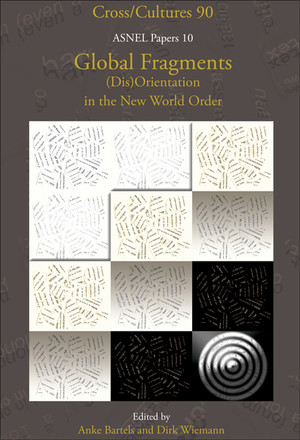
While the world seems to be getting ever smaller and globalization has become the ubiquitous buzz-word, regionalism and fragmentation also abound. This might be due to the fact that, far from being the alleged production of cultural homogeneity, the global is constantly re-defined and altered through the local. This tension, pervading much of contemporary culture, has an obvious special relevance for the new varieties of English and the literature published in English world-wide. Postcolonial literatures exist at the interface of English as a hegemonic medium and its many national, regional and local competitors that transform it in the new English literatures. Thus any exploration of a globalization of cultures has to take into account the fact that culture is a complex field characterized by hybridization, plurality, and difference. But while global or transnational cultures may allow for a new cosmopolitanism that produces ever-changing, fluid identities, they do not give rise to an egalitarian ‘global village’ – an asymmetry between centre and periphery remains largely intact, albeit along new parameters.
The essays collected in this volume offer readings of literary, theoretical, and filmic texts from the postcolonial world. These texts are read as attempts to articulate the global with the local from a perspective of immersion in the actual diversity of life-worlds, focusing on such issues as consumption, identity-politics, and modes of affiliation. In this sense, they are global fragments: locally refractured figurations of an experience of world-wide interconnectedness.
Table of Contents
Global Fragments: An Introduction
Glocal Identities: Mapping, Itineraries, Memories
Russell WEST-PAVLOV: Contemporary Asian-Australian Identities: Hsu-Ming Teo’s Love and Vertigo
Anja SCHWARZ: Mapping (Un-)Australian Identities: ‘Territorial Disputes’ in Christos Tsiolkas’ Loaded
Mala PANDURANG: Understanding Departure: A Study of Select Pre-Migration Indian Female Subjectivities
Frank SCHULZE-ENGLER: Black, Asian, and Other British: Transcultural Literature and the Discreet Charm of Ethnicity
Consuming Globality: Performance, Difference, Desire
Mita BANERJEE: Indian Diaspora Meets Indo-Chic: Fragmentation, Fashion, and Resistance in Meera Syal’s Life Isn’t All Ha Ha Hee
Hee
Christine VOGT-WILLIAM: Bhangra Babes: ‘Masala’ Music and Questions of Identity and Integration in South Asian-British Women’s
Writing
Ulrike KISTNER: AIDS, Pornography, and Conspicuous Consumption: Media Strategies of an HIV/AIDS Prevention Campaign in South
Africa
Justyna DESZCZ-TRYHUBCZAK: The Global Bidding for Dorothy Gale’s Magical Shoes: Salman Rushdie’s “At the Auction of the
Ruby Slippers” as a (Self-) Reflection on the Post-Frontier Predicament
Imagining Communities: Representation, Distortion, Affiliation
Kerstin KNOPF: Imagining Indians: Subverting Global Media Politics in the Local Media
Dieter RIEMENSCHNEIDER: Of Warriors, a Whalerider, and Venetians: Contemporary Maori Films
Dirk WIEMANN: Teaming Multitudes: Lagaan and the Nation in Globality
Kirsten RAUPACH: “Blanched Bones, Mouldering Graves and Potent Spells”: White Constructions of Black Diasporic Rituals in
Slave Culture
Silke STROH: Scotland as a Multifractured Postcolonial Go-Between? Ambiguous Interfaces between (Post-)Celticism, Gaelicness,
Scottishness and Postcolonialism
Constructing Common Ground: Networks, Concepts, Images
Tabish KHAIR: Universal Matters; Universals Matter
Frank LAY: Local Knowledge – Global Resistance: Policies of a New Technological “Enlightenment”
Andreas HEPP: Networks of the Media: Media Cultures, Connectivity, and Globalization
Emer O’SULLIVAN: At the Periphery of the Periphery: Children’s Literature, Global and Local
Local Colour in Global English
Rajend MESTHRIE: Dialect Representation versus Linguistic Stereotype in Literature: Three Examples from Indian South African
English
Anne SCHR?-DER: Camfranglais: A Language with Several (Sur)Faces and Important Sociolinguistic Functions
Teaching New English Literatures and Cultures
Liesel HERMES: Henry Lawson’s “The Drover’s Wife” and the Australian Short Story
Laurenz VOLKMANN: West Meets East / East Meets West? Teaching William Sutcliffe’s Cult Novel Are You Experienced? (1997)
Claudia DUPPÉ & Manfred GANTNER: Read the Texts and Let Them Speak, Too: Teaching New Zealand Poetry in the Sixth Form
Gisela FEURLE: Teaching the New South Africa: The Cartoon Strip Madam & Eve.
NOTES ON CONTRIBUTORS.
